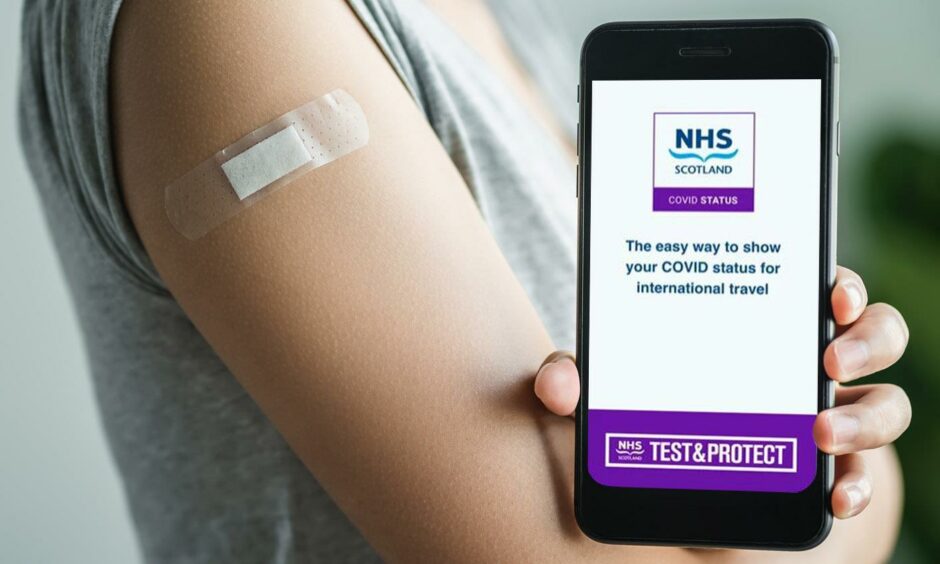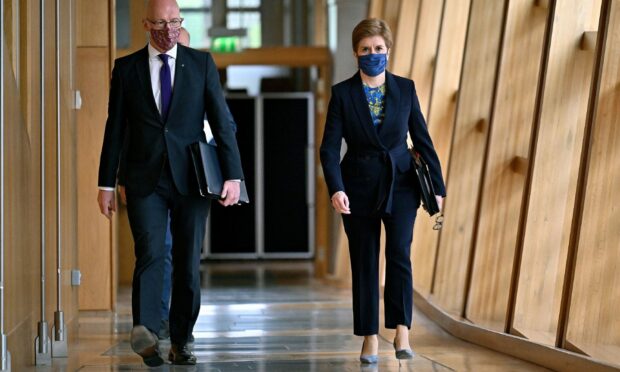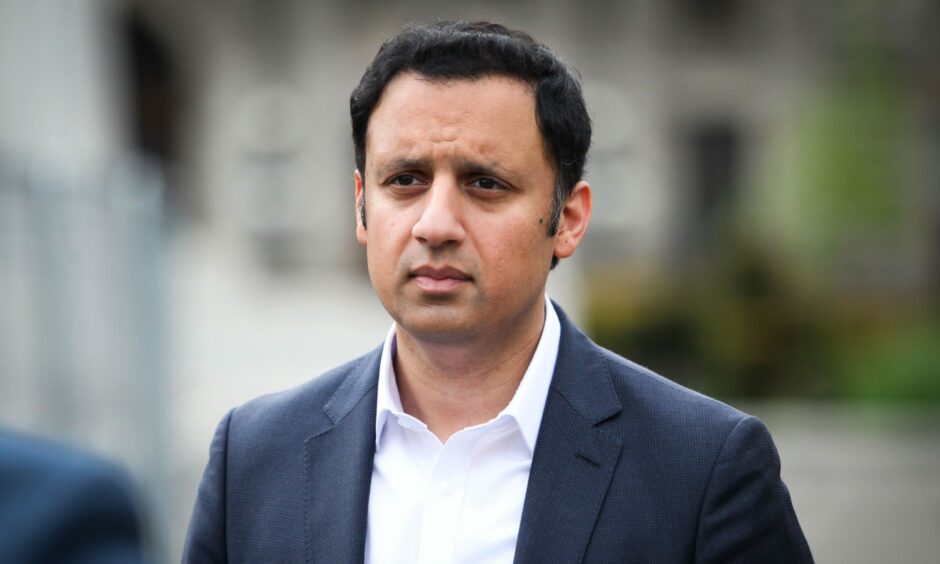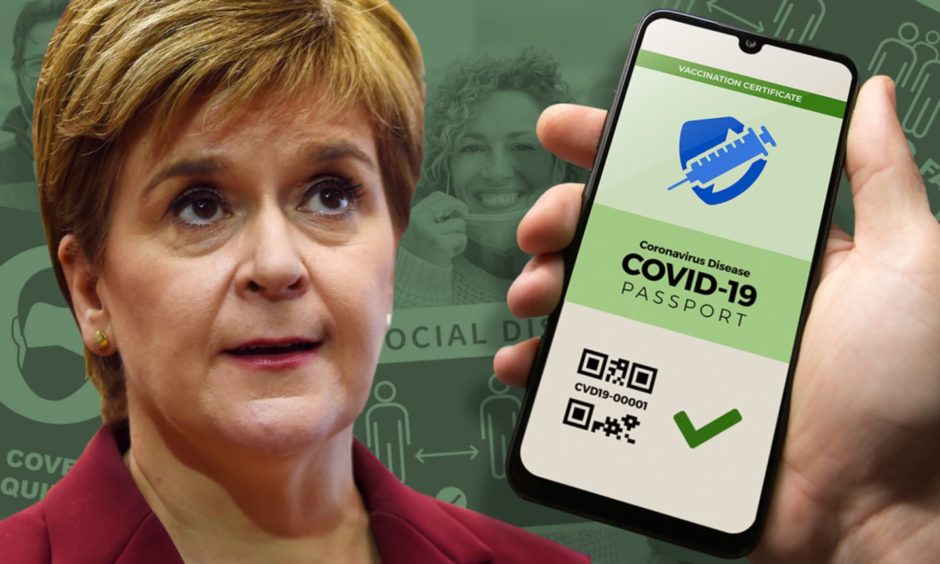Nicola Sturgeon has been urged to “change or ditch” the Scottish Government’s Covid vaccine passport app amid problems in its roll-out.
The first minister apologised for the calamitous launch of the app which she blamed on an issue with NHS systems.
However, opposition party leaders criticised the SNP leader for the “shambles” surrounding the scheme’s implementation.
It comes as Deputy John Swinney unveiled to MSPs the government’s Covid recovery strategy as the country looks to recover from the pandemic.
‘Predictable disaster’
Scottish Labour leader Anas Sarwar said the “shambles that followed the release of the vaccine passports app was a predictable disaster”.
Mr Sarwar told MSPs: “It is the consequence of an arrogant government, forcing through its ill thought through plans despite concerns from the public, public health experts and businesses.
“The promised app was rushed out last minute.
“It crashed just minutes later.”
He called on the first minister to “change or ditch the system” amid the problems.
The certification scheme became available for download on Thursday afternoon, less than 12 hours before the law requiring proof of vaccination to access certain venues and events came into force.
Immediately many users ran into difficulties getting the app to show their vaccine status, or to even recognise that they existed in NHS records.
The first minister apologised for the issues around the roll-out, which she blamed on a problem with the NHS systems that the app links to.
Ms Sturgeon said vaccine certification remains a “proportionate way of encouraging people to get vaccinated and also of helping large events and night-time hospitality to keep operating during what will be a potentially very difficult winter”.
‘Instantly a disaster’
Scottish Conservative leader Douglas Ross said the launch of the app was “instantly a disaster”, with many users unable to find the app or experiencing problems accessing their vaccine record.
The Highland and Islands MSPs added: “It’s extraordinary that Nicola Sturgeon won’t accept that this disastrous policy should have been delayed, after such a chaotic start.”
Alex Cole-Hamilton, Scottish Liberal Democrat leader, said Scotland is the “only country in Europe” to use Covid-19 vaccination certification in isolation without the alternative of a negative lateral flow test verification.

He pressed the first minister on whether the public will trust the scheme – after the “shambolic” roll-out – and whether “clear and practical guidance” has been issued to venues required to carry out the checks.
Ms Sturgeon said “guidance is in place for the venues required to do Covid certifications” with businesses having a grace period until October 18 to enforce the scheme.
It was revealed on Tuesday that those attending the COP26 summit in Glasgow will not need to use the Scottish Government’s Covid-19 passport.
However, the first minister said her government is working with the UK Government and the United Nations in terms of “overall mitigations in place around COP26”.
She added: “There are arrangements around testing and other mitigations that those attending COP will be required to comply with.”
Covid recovery strategy
Mr Swinney delivered a ministerial statement to MSPs on Tuesday around the Scottish Government’s Covid recovery plan.
The deputy first minister said the strategy would have a “laser focus” on addressing systemic inequalities made worse by Covid and remobilise public services to be more focused on people’s needs.
Actions the Scottish Government has vowed to take over the next 18 months include:
- Expand early funded early learning and childcare for children aged one and two, starting with low-income families.
- Design a wraparound childcare system providing care before and after school, all year round, where the least well-off families will pay nothing.
- £200 million fund for retraining workers whose jobs are at risk due to the pandemic or the transition to a net zero economy.
- Provide free school lunches to every child in primary school and to all children in state-funded special schools by August 2022.
- Deliver a further 110,000 affordable homes by 2032, with at least 70% in the social rented sector and 10% in remote, rural and island communities.
- Publish a fuel poverty strategy by the end of the year.
- Introduce a community bus fund, supporting local transport authorities to improve public transport in their areas.
- Invest £2.9m over two years to place welfare rights advisors in up to 150 GP surgeries in Scotland’s most deprived areas.
Peter Kelly, director of the Poverty Alliance, said: “The levels of poverty and inequality in Scotland made the impact of the pandemic so much worse than it might otherwise have been.
“Insecure and undervalued employment, social security benefits that were inadequate and ingrained inequality all meant that some communities bore the brunt of Covid.
“As we look towards the end of the pandemic, it is right that the Scottish Government prioritises a recovery that addresses these underlying inequalities.”


